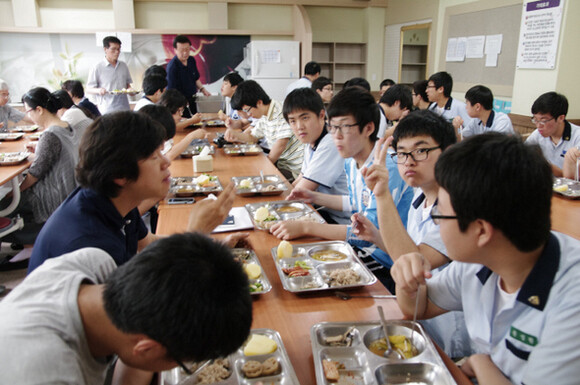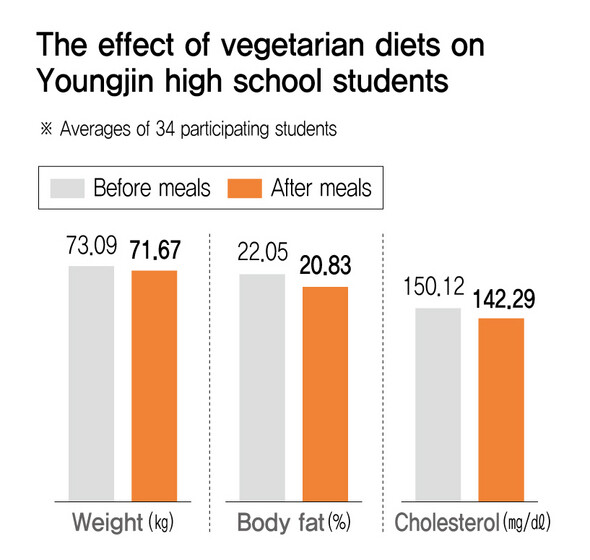hankyoreh
Links to other country sites 다른 나라 사이트 링크
Schools successfully experimenting with vegetarian meals

By Yang Seon-ah, staff reporter
“It’s like a miracle. I’ve been suffering from atopy for 16 years but the symptoms completely disappeared in 103 days. I’m going to live as a vegetarian eating brown rice for the rest of my life,” Cho Min-hyuk, high school senior in Daegu, said with great confidence.
Atopy (atopic syndrome) is a syndrome characterized by a tendency to be hyperallergic. A person with atopy typically presents with one or more of the following: eczema (atopic dermatitis), allergic rhinitis (hay fever), allergic conjunctivitis, or allergic asthma. Patients with atopy also have a tendency to have food allergies.
Cho, 19, had tried a variety of treatments for his atopy, but none had been effective. He has worn long pants in Daegu’s hot summer to hide the scars left by scratching ever since elementary school, when he heard his female classmate call his scars “disgusting.”
But since his atopy symptoms disappeared, Cho has worn short pants and not worried about what other people think of him. With the itchiness gone, his grades improved because he can concentrate better. He sleeps well.
“I want to use my vegetarian experience to study nutrition or life science in university,” said Cho.
It was the school meals at Cho’s Young-jin High School in Daegu that totally changed his life. The school has provided 34 students with vegetarian lunch and dinner from April 2nd to July 13th. Those students’ parents had to sign an agreement promising to provide their kids with vegetarian meals at breakfast and on weekends.
This project started when Daegu Metropolitan Office of Education selected Young-jin High School as a pilot case for vegetarian meals. Daegu Green Consumer Network of Korea (DGCNK) joined the project, which was supported by many experts like neurosurgeon Hwang Seong-su (also known as the ‘Vegetarian evangelist’, Kyungpook National University Medical College professor Lee Duk-hee and Kim Sung-hee of Daegu Catholic University.
Instead of the typical white rice, participating students ate a mixture of brown rice and brown glutinous rice. The side dishes were made up of a variety of vegetables and tofu. 22 teachers also participated in the project and shared a separate ‘vegetarian cafeteria.’
Principal Hong Sung-tae, who has been a vegetarian for 10 years, strongly supported vegetarian meals at school. Young-jin high school had already been providing students with vegetarian meals once a week.
Principal Hong said, “The majority of the students want to eat meat after having vegetarian meals, but the school has been using a support program for vegetarians.”
The school invited experts to give lectures to students and parents on the effects of and correct ways to consume vegetarian meals. Teachers encouraged students: “If you’re able to stop yourself from eating what you want for more than 100 days, that means you can overcome any difficulties you might encounter in the future.”
All 34 volunteers succeeded in sticking to exclusively vegetarian diets for 103 days and the school awarded them with certificates. The school opened an essay contest on the participating students’ experiences with vegetarianism and had the students’ experiences reflected on their grade reports.
Cho said, “I really wanted to give up during my second week because the itchiness had actually gotten worse. But I was able to overcome my temptation to eat meat or bread because my friends and teachers were with me. Listening to experts’ testimonies also helped.”
Hwang Jeong-seob, who lost 11kg (about 24 pounds) during the project, said “Before this project, I thought having a vegetarian diet meant eating only vegetables. But I was deeply touched when Doctor Hwang said that being a vegetarian means eating everything except meat, fish, eggs and milk.” For Hwang Jeong-seob, this was a revolution of perception.

With the collaboration of the Office of Education, school, parents, teachers and regional experts, the participants’ health greatly improved. 25 students lost weight and 27 students lost body fat. 23 students experienced a drop in their cholesterol levels. Two students who suffered from atopy, five students who had acne, two students who suffered indigestion and 1 student who had a fatty liver all recovered.
Professor Kim Sung-hee from Daegu Catholic University’s department of Family Medicine, said, “The students are so much healthier now after only three months, and I believe the vegetarian diet contributed to this change.” Six of the students who participated in the project continue to bring vegetarian lunches even now that the project is over.
Principal Hong said, “Through this project we were able to confirm that a vegetarian diet improves students’ health and concentration. I hope Korean society accepts the wishes of the minority with different eating habits.”
Presently, Gwangju and the Jeolla provinces are showing interest in vegetarian meals. Koh Yong-seok, representative of Practice Vegetarianism with a Love of Life, said, “300 school in Gwangju, 30 schools in North Jeolla and some schools in South Jeolla are providing vegetarian meals once a week. The school board needs to recognize the importance of vegetarian meals and have the will to carry them out. A proper understanding of vegetarianism is crucial for such progress.”
Translated by Yoo Hey-rim, Hankyoreh English intern
Please direct questions or comments to [english@hani.co.kr]

Editorial・opinion
![[Guest essay] The real reason Korea’s new right wants to dub Rhee a founding father [Guest essay] The real reason Korea’s new right wants to dub Rhee a founding father](https://flexible.img.hani.co.kr/flexible/normal/500/300/imgdb/original/2024/0423/8317138574257878.jpg) [Guest essay] The real reason Korea’s new right wants to dub Rhee a founding father
[Guest essay] The real reason Korea’s new right wants to dub Rhee a founding father![[Column] ‘Choson’: Is it time we start referring to N. Korea in its own terms? [Column] ‘Choson’: Is it time we start referring to N. Korea in its own terms?](https://flexible.img.hani.co.kr/flexible/normal/500/300/imgdb/original/2024/0423/3617138579390322.jpg) [Column] ‘Choson’: Is it time we start referring to N. Korea in its own terms?
[Column] ‘Choson’: Is it time we start referring to N. Korea in its own terms?- [Editorial] Japan’s rewriting of history with Korea has gone too far
- [Column] The president’s questionable capacity for dialogue
- [Column] Are chaebol firms just pizza pies for families to divvy up as they please?
- [Column] Has Korea, too, crossed the Rubicon on China?
- [Correspondent’s column] In Japan’s alliance with US, echoes of its past alliances with UK
- [Editorial] Does Yoon think the Korean public is wrong?
- [Editorial] As it bolsters its alliance with US, Japan must be accountable for past
- [Guest essay] Amending the Constitution is Yoon’s key to leaving office in public’s good graces
Most viewed articles
- 1[Guest essay] The real reason Korea’s new right wants to dub Rhee a founding father
- 2Terry Anderson, AP reporter who informed world of massacre in Gwangju, dies at 76
- 3Why Korea shouldn’t welcome Japan’s newly beefed up defense cooperation with US
- 4[Column] ‘Choson’: Is it time we start referring to N. Korea in its own terms?
- 5Senior doctors cut hours, prepare to resign as government refuses to scrap medical reform plan
- 6Opposition calls Yoon’s chief of staff appointment a ‘slap in the face’
- 7[Column] The clock is ticking for Korea’s first lady
- 8New AI-based translation tools make their way into everyday life in Korea
- 9[Editorial] Japan’s rewriting of history with Korea has gone too far
- 10[Column] Are chaebol firms just pizza pies for families to divvy up as they please?